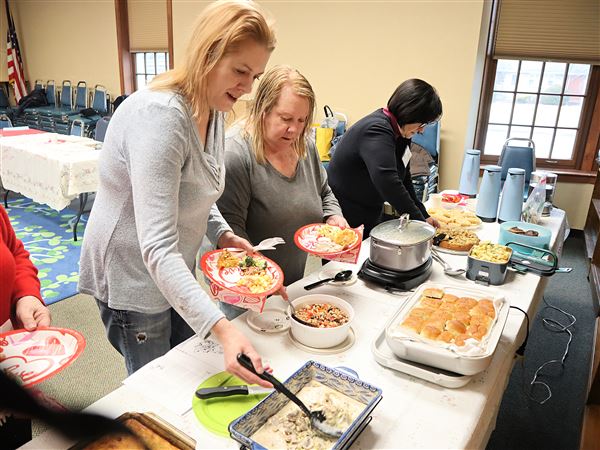At first glance, Pizza Bari might appear like another pizza joint in a city teeming with them. The Downtown restaurant’s website and online menu, chock full of specialty pizzas, wings, hoagies and “Italian dinners,” seem to confirm this.
Behind the facade of the unassuming storefront on Liberty Avenue is something entirely different: a vibrant restaurant featuring a robust menu of Uzbek dishes such as plov, chuchvara, manti and lagman that are the heart of the Central Asian nation’s food culture.
Pizza Bari isn’t alone.
Over in the West End, Pizza Bella Monte shares space with Chaykhana Pittsburgh, an equally ambitious restaurant dedicated to the country’s cuisine.
“There are a lot of Uzbek people coming to Pittsburgh from different states. The rent is affordable and people enjoy living in this city,” says Sarvar Abdurashidov, owner of Chaykhana/Bella Monte.
Abdurashidov estimates that anywhere from 3,000-4,000 people from Uzbekistan now call Pittsburgh home and that number is growing. He says the boom in population over the last couple of years reflects an opportunity for his compatriots to build nest eggs by driving ride-share, food delivery and trucking jobs.
It’s an example of the chain migration that happens when people settle in a new place and tell their family and friends how much they like living there. The strong community bonds help sustain cultural ties and provide a support network for newcomers adjusting to their new environment.
“We had many friends who came to America that told us about Pittsburgh,” says Pizza Bari co-owner Khurshid Toshpulatov. “The lifestyle is very nice here. People are very friendly. This feels like a real hometown city.”
Flavors of Uzbekistan
The dishes of Uzbekistan, laden with history and cultural significance, contribute to one of the most fascinating and unheralded stories in global cuisine. Although it’s a landlocked nation, its place at a crossroads of cultures for more than 2,000 years makes it one of the longest-standing examples of geographic fusion cooking.
“Food is one of the most important parts of how we define Uzbek culture,” says Pizza Bari co-owner Sultonmurod Dshbulatov. “This is the food of Central Asia. We have drawn from many influences in our cuisine. If you haven’t tasted my country’s food, it’ll be a big treat for you.”
Uzbekistan's cities reigned for centuries as primary hubs on the ancient network of commerce known as the Silk Road, bringing spices, ingredients and culinary techniques from various cultures.
Islam became the dominant religion — and left its lasting culinary influence — in the 7th century. The rise of Mongol armies led by Genghis Khan at the end of the 12th century brought new foodways from the east. Later, Persian culture entered the region, although it also maintained its Turkic dining traditions. From the late 19th century until the 1990s, Uzbekistan was part of the Russian Empire and the USSR.
What does the rise in Uzbek cuisine mean for Pittsburgh? A mouthwatering amalgamation of flavors.
Plov, considered the national dish of Uzbekistan, is a fragrant rice platter similar to pilaf, biryani and paella. It is typically prepared with succulent chunks of meat (most often mutton or lamb), sweet carrots, aromatic onions and a firm pinch of cumin. Scores of regional variations also allow for additions like nutty chickpeas, tangy barberries, plump raisins and herbaceous coriander. More complex iterations of plov, made in Uzbekistan for at least a millennia, tend to be served at joyous celebrations.
Chaykhana’s Abdurashidov, for example, helped lead a group of chefs preparing 1,000 pounds of plov for an estimated 2,000 people in Pittsburgh’s Uzbek community to celebrate Eid al-Fitr, the end of Ramadan, at a park in the West End. The plov served daily at his restaurant, enhanced with warm baking spices, unabashed lamb flavor and crisped fatty lamb skin, is based on his wife’s family recipe.
“This is what we are most famous for and the first dish other people from Uzbekistan ask for when they come in here,” he says. “It’s what you should try the first time you come in, too.”
Lagman, chewy, springy strips of hand-pulled noodles, showcase another facet of Uzbekistan’s culinary history — the wheat-based influence of Chinese, Mongol and Uyghur foodways. The typical mix of peppers, eggplant, potatoes, tomatoes and seasonings accompanying the noodles, however, draws from Eastern European and Indian flavors.
Meanwhile, the pelmeni that play a substantial role in Uzbekistan’s incredible dumpling culture (more on that when Pittsburgh Dumpling Project: Part 4 launches on May 23) draw a direct line to the two centuries of Russian and Soviet control of the country.
In Uzbek restaurants, they’re served in a variety of formats. You’ll find these diminutive dumplings with a classic sour cream accompaniment, but you’ll also get them floating in rich broth. They’re in lamb broth at Pizza Bari, while Chaykhana delivers them Turkic-style in a lighter chicken soup.
One item that ties much of Uzbek food together is dill — lots of dill.
“This is all just a small piece of our cuisine. Our country is very famous for how much we love food,” says Pizza Bari employee Odil Mirsoatov, who has lived in the United States for nine years, but moved to Pittsburgh about a year ago after hearing how much his sister liked living here.
A meal for everyone
Dshbulatov and Toshpulatov opened Pizza Bari in mid-2022 to stand out in Pittsburgh’s semi-saturated (and often wonderful) pizza market by operating under halal dietary laws.
Toshpulatov says the business quickly attracted the growing population of Uzbeks, as well as other Pittsburghers who follow Islamic culinary guidance.
“We had all of our Muslim customers who were coming here for the halal food — Arabic, African, Turkish, Kazak, Tajiks — so many people who all live here in Pittsburgh. They asked for us to share our food,” she says.
“The best thing is that it’s for everyone. Our American customers ask for it now, too.”
The story is similar at Chaykhana, where the sign above the restaurant still reads “Bella Monte.”
The pizza at both restaurants, the classic, medium-thick, American gas-oven style you’ll often find at office parties and events, is pretty good.
Abdurashidov moved to Pittsburgh 10 years ago. He won a green card and started working at pizza shops owned by his friends, saving enough money to purchase the building where he now operates. The pizza shop passed hands a few times until he decided to take it over late last year. In the meantime, with more people from his home country living and working in Pittsburgh, he added more Uzbek dishes to the menu.
Like Pizza Bari and Kavsar (Pittsburgh’s first Uzbek restaurant, which now operates as a takeout-only establishment), everything he serves is halal.
“I wasn’t sure if it was going to be just for Uzbeks, Russians, Kazakhs and other people who are familiar with our food. But now everyone is enjoying it,” he says.
His space is indeed a gathering place for his Uzbek compatriots, particularly those who are there to chow down on a plate of luscious lamb shanks after or during a day of driving.
Over the last few months, however, it’s become a welcoming spot — and destination dining — for a diverse group of food lovers in Pittsburgh drawn to recipes developed by Abdurashidov’s wife and cooked by a rotating team of 10 chefs.
“It feels so good to have this Uzbek restaurant,” he says. “We have hundreds of pizza places around here, so now we get to share the food of our country, too. I love food. I love cooking, I love taking photos of it and videos. The best thing in this life is to love what you can do, share it with people and make money from it.
“We need a bigger space so we can serve more people.”
Pizza Bari: 955 Liberty Ave., Downtown; pizzabaripgh.com
Chaykhana Pittsburgh: 410 South Main St., West End; instagram.com/chaykhanapittsburgh
First Published: April 30, 2024, 9:30 a.m.
Updated: May 1, 2024, 4:03 p.m.



















